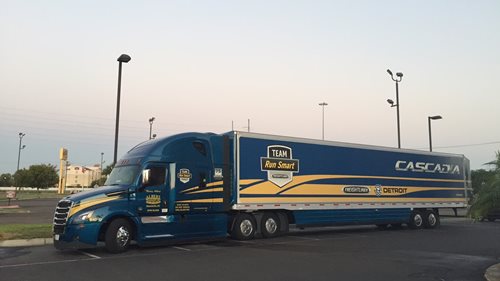
Part of the reason why I believe my goal of hitting 10 MPG at 70+ MPH can be achieved is due to the way I look at the components used to build the truck and trailer. Average are very important and knowing what your true averages to have a truck and trailer combination that will perform well in a wide range of operating conditions. To read about the start of my 70+/10 project read my first blog on this subject https://www.teamrunsmart.com/articles/truck-smart/safety/march-2018/project-70-10
Averages are very important as we use it to figure our income per mile and our cost per mile. An average is a finite number and not a range. When you ask someone “what is their average fuel mileage”? The reply is often given in a range. For example, they might tell you that they get 6.5 mpg to 7.5 mpg. This is not exactly the answer to the question. An average will be a number and not a range. The answer will be an exact number such as 6.8 or 7.1 etc…
Averages also become important when you order a new truck. This is because questions such as “what speed do you plan to run”? and weight is a critical issue to be discussed. The question in regards to operating speed is often answered with the maximum speed in which you plan to operate. While knowing your maximum speed and its importance, it’s also vital to know your average speed. This can be found by running a detailed engine report. The report will not only give you the lifetime average speed but also monthly and daily averages as well. Knowing your average here is very important in regards to maximum fuel efficiency. You want to excel at your average and be able to do the maximum well. If you set up a truck to excel at the maximum speed, your overall average will most likely suffer. Typically, I add two to three miles per hour to the averages on the report as to account for my in town and traffic jam mileage.
In regards to the gross vehicle weight, the most common answer that drivers will give to a truck salesperson is 80,000lbs. This number is most likely the maximum gross vehicle weight that they plan to achieve. It’s important to know this number as the truck needs to have the capability of handling 80,000 lbs. from a safety and durability standpoint. However, the crucial number from an efficiency standpoint once again will be your average weight. To figure out your average gross vehicle weight requires a bit more homework than figuring out your average speed. You will need to know your total amount of empty miles as well as your loaded miles. For example, in some tanker operations there is 50% empty miles. The tanker truck may go one direction at 80,000lbs and be only 30,000 lbs. empty traveling back to the terminal. By adding the 80,000lbs and the 30,000lbs together will equal a total of 110,000lbs. If you divide these by two, this will give you an average GVW of 55,000lbs. I used the tanker example for two reasons. The first being that it was simple math to demonstrate. The second being many tanker operations opt for smaller engines to reduce their weight and increase their payload. I don’t often get held up by tanker trucks on the road and therefore their formula seems to work quite well.
Finally, the grade changes of terrain in which you travel are also an important factor in figuring out what components you want to order on the truck. If you are going to run a dedicated route, your dealer can run a computer simulated report using different components. If you are running 48 states on irregular routes, this would prove difficult to simulate. Instead, my way of looking at this is in the fact that most of our country is flat and where it isn’t flat the other half is downhill. The reason I say this is so that you don’t put too much emphasis on getting up over the mountain as it is a small portion of your total operation.
I hope that this helps anyone who may be ordering a new or choosing a used truck. This formula has served me well over the years in the operation of my business